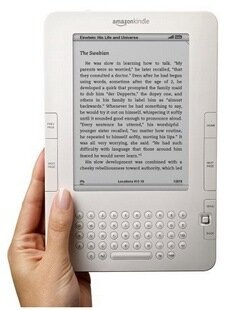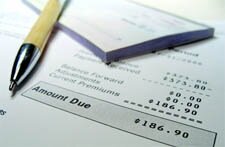Amazon Kindle 2 clears its carbon footprint in 1 year
 The book business is huge worldwide, and in the United States alone the industry harvests 125 million trees to meet the needs of its readers. For a long time, paper was the only really good option for reading longer works, but now e-readers like the Amazon Kindle 2 provide another way to read without the eyestrain of a backlit screen.
The book business is huge worldwide, and in the United States alone the industry harvests 125 million trees to meet the needs of its readers. For a long time, paper was the only really good option for reading longer works, but now e-readers like the Amazon Kindle 2 provide another way to read without the eyestrain of a backlit screen.
That’s a good thing, because cutting down trees is only the beginning when it comes to publishing books. Processing the wood into paper, printing on it and transporting it all add to the expenditure of energy and exhaust of carbon into the atmosphere. A new study by Cleantech claims that each purchase of an e-reader like the Kindle 2 could “displace the purchase of 22.5 physical books.”
Right now sales of e-book readers like Amazon’s Kindle 2 and Sony’s Digital Reader reached 1 million so the impact of carbon savings isn’t significant yet. In the first quarter of 2009 e-book readers accounted for about $114 million in sales compared to $24.3 billion in the traditional book industry. The sales of e-books are growing fast too – 154.8 percent by the end of April compared to a loss of 4 percent in the traditional book industry.
Related articles
Adoption of the Kindle 2 and other e-readers depends largely on the price of entry, content selection, and pricing of content. Amazon recently dropped the price of the Kindle 2 to $299, but that’s still a hefty price to swallow for someone who’s used to dropping $8 for the latest paperback. Even after a consumer buys a Kindle 2, the device is only as good as its content selection and right now many publishers are hesitant about making their books available. Then there are use restrictions on some titles where text-to-voice is disabled, or Amazon can pull back something you’ve already purchased if it chooses to.
Once publishers and consumers find a common ground on the price paid for usage granted then the e-reader space has potential to rise quickly in popularity. Until then, borrowing a book from a neighbor or heading to a public library are good alternatives to reduce your carbon footprint.
Advertisement
Follow us


Comments
That's great. I mean, the newer ebooks (such as Kindle) read almost like paper - Check one out if you get the chance. It's pretty easy to find a Sony eBook in a mall. Kindle has the same feel of paper-like reading to it.
Having said that, the reason I hesitate to get a Kindle is due to the closed eco-system of the Kindle system, which makes Amazon the gatekeeper in that case. Still, Kindle is awesome in multiple ways.
An irony is that Amazon does have an awesome MP3 store that is DRM-free with a large selection and often good prices. Yet that is a completely open format, which is preferrable.
On the note about Amazon, I recently came across an interesting table that details the discounts on Amazon.
It is at http://www.uberi.com
Maybe someone will find it useful too. While you are there, I would suggest checking out the "Amazon Filler Item" among other things there when you get a chance. It's quite amusing.
When the importance of e-readers over books are discussed we don't have to think twice on which to support. Definitely it is the e-readers and such discussions makes me wiser not to be too choosy over Kindles, Nook, Sony or Apple's iPad. There is nothing better than gadgets or policies which encourage paperless objectives. If only e-readers are not too expensive everyone would be using one replacing books which cause deforestations.
Suntree real estate
The cleaning agents are like magnets. Once they're released into the wash, they're immediately drawn to dirt and stains to get your clothes clean. Unlike traditional detergents, more of the cleaning agents are used, which is why you can use so much less. All this adds up to cleaner clothes and a greener footprint.Paper printing